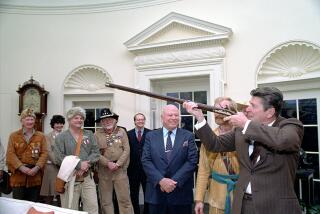Late, Great Middle Class
- Share via
Over the last four years, President Bush has been ridiculed for his public speaking errors. He’s been hammered for saying people “misunderestimate” him and mocked for asking “is our children learning?” But it’s his omissions, not his errors, that should concern Americans.
Since his inauguration, the president has delivered more than 1,000 major addresses, news conferences and short public remarks. Yet he has uttered the phrase “middle class” in only 34 of them. On Thursday night at the convention, he kept the pattern going -- the phrase never passed his lips.
Maybe it’s just an oversight, but in such a highly scripted White House, is anything left to chance? Omitting references to America’s most critical demographic is surely no accident -- it’s evidence of a tectonic shift in philosophy. No longer part of a bipartisan consensus that government should work to expand opportunity for ordinary Americans, conservatives are instead eliminating those opportunities. Bush’s words -- or lack thereof -- simply punctuate the effort.
Consider, for example, decent wages. The gateway to the middle class is considered to be a salary of about $35,000 a year. Yet the Bush administration has refused to support a serious increase in the minimum wage, which at $5.15 an hour provides a salary of less than $12,000 a year -- well below the poverty line. At the same time, the White House has worked to strip workers of federal overtime pay protections, and in budget after budget it has tried to cut billions out of job training programs.
Access to adequate healthcare is another marker of middle-class status. And yet the White House is making it harder to get that care. The president’s health savings accounts, which would put money into the consumers’ hands, also would allow employers to contribute less to workers’ coverage. In other words, annual health insurance deductibles probably would go up. And then there’s last year’s Medicare reform. According to the Wall Street Journal, the administration included a little- noticed provision in the legislation that allows companies to continue receiving tax breaks even if they severely reduce workers’ healthcare coverage.
On prescription drugs, it’s a similar story. As prices skyrocket, the president’s Medicare bill all but ensured hundreds of billions in profits for the pharmaceutical industry without providing truly comprehensive drug coverage to seniors. The bill did nothing to prevent drug companies from charging Americans the highest prices in the world. When lawmakers tried to give Medicare the power to negotiate discounts, they were blocked by White House allies. And the administration continues to oppose letting Americans purchase lower-priced, FDA-approved medicines from abroad.
In fairness to the president, on a few occasions he has targeted the middle class for aid. In 2001, his tax policy was supposed to help “families struggling to enter the middle class.” But that was the same policy that rolled back the top tax rates, stock dividend taxes and the estate tax on the super-wealthy. In fact, the White House has given more than half of all its new tax cuts to those making an average of $1 million a year, leaving the middle class with a larger share of the tax burden. And it could get worse. On Thursday night, Bush mentioned “tax reform” -- a likely reference to a national sales tax or flat tax that congressional Republicans already are pushing. Even President Reagan’s Treasury Department noted that a flat tax “would involve a significant redistribution of tax liability” away from the wealthy and onto ordinary Americans. And a study by the nonpartisan Citizens for Tax Justice finds a national sales tax would mean tax increases on the bottom 80% of income earners.
Instead of squeezing the demographic group that defines the American dream, Bush and his band of conservatives should be working to expand it. One of their own icons got it right many years ago. “Upper classes are a nation’s past,” wrote Ayn Rand, “the middle class is the future.”
Unfortunately, Bush and his Republican Party disagree.
More to Read
Get the L.A. Times Politics newsletter
Deeply reported insights into legislation, politics and policy from Sacramento, Washington and beyond. In your inbox twice per week.
You may occasionally receive promotional content from the Los Angeles Times.










